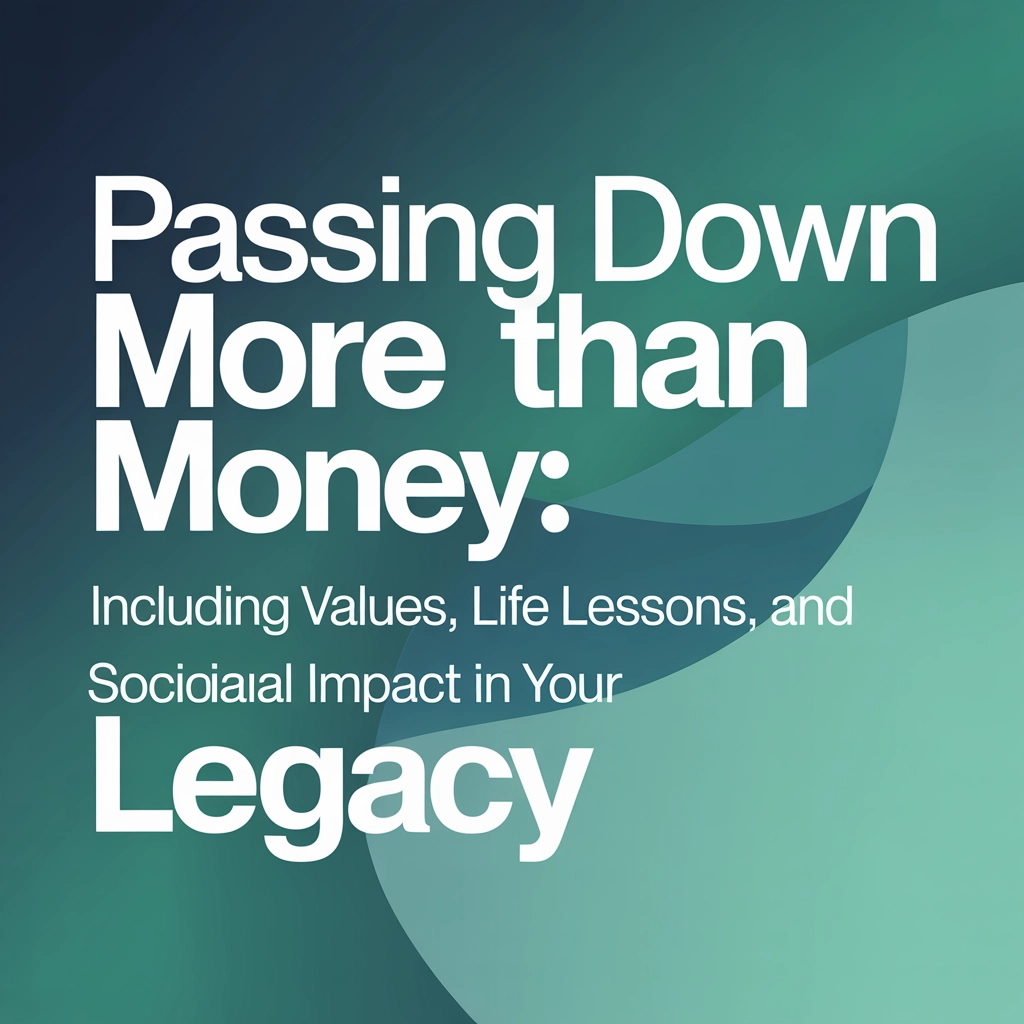Passing Down Value: Why Your True Legacy Is More Than Money
When most people think about legacy planning, their minds immediately jump to wills, trusts, and who gets what assets. But here's something that might surprise you: nearly one in five people now say that passing down values or life lessons will be their most meaningful legacy — not their financial wealth.

As an estate planning attorney, I've seen families torn apart over money, but I've also witnessed the incredible power of families united by shared values and purpose. The truth is, your most valuable inheritance isn't what you leave behind in your bank account — it's who you help your loved ones become.
Why Values Matter More Than Valuables
Your financial assets will eventually be spent, invested, or passed down again. But the values you instill? Those compound across generations, creating ripple effects you'll never fully see.
Think about it: the teacher who inspired 140 students each year didn't leave them money, but their influence shaped careers, relationships, and life choices for decades. The parent who demonstrated integrity during tough times gave their children a moral compass worth more than any inheritance check.

Your legacy includes every meaningful interaction, every teachable moment, and every time you chose to do the right thing when no one was watching. These moments create the foundation upon which your family's future is built.
The Three Pillars of a Meaningful Legacy
1. Personal Values and Character
Your core beliefs about honesty, hard work, compassion, and resilience become the DNA of your family's character. But here's the key — these values must be lived, not just preached.
Children and grandchildren learn more from watching how you handle adversity than from listening to your advice about it. When you show them how to treat service workers with respect, how to admit mistakes gracefully, or how to help neighbors in need, you're making deposits into their character accounts.
Consider documenting these values explicitly. Write letters to your children explaining not just what you believe, but why. Share the stories behind your convictions — the failures that taught you humility, the mentors who shaped your thinking, the moments when you had to choose between easy and right.
2. Life Lessons and Wisdom
Every family has stories that deserve to be preserved and shared. These aren't just entertaining tales — they're guideposts for future generations facing their own challenges.

Maybe it's the story of how your grandparents built their business from nothing, teaching lessons about perseverance and calculated risk-taking. Perhaps it's how your parents navigated a difficult marriage, showing that commitment means working through problems together. Or it could be your own story of overcoming addiction, demonstrating that redemption is always possible.
These stories become more powerful when they're connected to specific values and lessons. Don't just tell the story — explain what it means and how it should influence future decisions.
3. Social Impact and Community Connection
Your legacy extends far beyond your family circle. The positive impact you have on your community, profession, and causes you care about creates a broader legacy that can inspire future generations to think beyond themselves.
This might mean establishing charitable traditions, mentoring others in your profession, or simply modeling what it means to be a good citizen. When your children see you volunteering at the food bank or helping elderly neighbors, they learn that privilege comes with responsibility.
Practical Tools for Passing Down Your Values Legacy
Ethical Wills and Legacy Letters
Beyond your legal will that distributes assets, consider creating an ethical will — a document that passes down your values, life lessons, and hopes for future generations. These can be letters to individual children or grandchildren, sharing specific wisdom meant just for them.
These documents don't have legal weight, but their emotional impact can be profound. Imagine your great-grandchild, facing a difficult decision decades from now, reading your words about the importance of integrity or the value of taking calculated risks.
Family Mission Statements

Some families benefit from creating formal mission statements that outline their shared values and commitments. This isn't just a cute exercise — it becomes a touchstone for making decisions about education, career choices, philanthropy, and how family resources should be used.
A family mission statement might include commitments to education, service to others, environmental stewardship, or maintaining close family relationships despite geographic distance.
Storytelling Traditions and Documentation
Establish regular opportunities for sharing family stories and values. This could be annual family reunions where older generations share their experiences, or simple traditions like Sunday dinners where current events are discussed through the lens of family values.
Consider recording these stories — both the struggles and triumphs — so they're preserved for future generations. Video recordings of grandparents sharing their immigration stories or parents explaining how they met and fell in love become precious family treasures.
Baranski Law’s Personalized Legacy Recording Service
At Baranski Law, P.C., every estate plan includes a complimentary legacy recording feature. As part of your planning process, I’ll professionally guide you through capturing audio or video messages for your loved ones—sharing the values, wisdom, and life lessons that shaped you—at no extra cost.
What to expect: I provide simple prompts and conversation starters, help you organize messages for specific people or milestones, and make sure each recording is stored securely alongside your legal documents. We can add written transcripts for accessibility, and you can update your recordings over time as your story evolves. I’ll also coordinate delivery so your messages are shared at the right time, according to your instructions.
Clients tell me that hearing a parent’s voice or seeing a grandparent’s smile often means more than any financial bequest. By including these recordings with your plan, we help pass down the intangible gifts—stories, context, encouragement, and meaning—so your heirs inherit not just what you owned, but who you were.
This is a built-in part of every plan we deliver—there’s nothing extra to buy or schedule. When we work together, we’ll make your legacy recording a seamless, integral piece of your family’s legacy.
Mentorship and Involvement
Your children and grandchildren need to see your values in action, not just hear about them. Include them in your charitable activities, business decisions, and community involvement. Let them witness how you handle conflicts, make difficult decisions, and treat people from all walks of life.
This hands-on learning is often more valuable than any formal inheritance. When young people see their elders living with purpose and integrity, they're more likely to adopt these same characteristics.
Integrating Values into Your Legal Estate Plan
Your formal estate planning documents can and should reflect your values legacy. Here are some ways to align your legal planning with your values:
Trust Provisions with Purpose

Modern trust drafting can include incentive provisions that reward beneficiaries for living according to family values. This might mean distributions for educational achievements, charitable giving, or starting businesses that align with family principles.
Some families create trusts that provide larger distributions when beneficiaries demonstrate commitment to causes the family cares about — environmental conservation, education, or community service.
Charitable Planning as Values Teaching
Including charitable components in your estate plan teaches future generations about the importance of giving back. Whether it's a private foundation, donor-advised fund, or simple charitable bequests, these gifts model generosity and social responsibility.
When children see that their parents' final act was to help others, it reinforces the message that success comes with obligations to serve the broader community.
Business Succession with Values
If you own a business, succession planning offers opportunities to reinforce family values. This might mean requiring next-generation leaders to work elsewhere first, demonstrate specific competencies, or commit to maintaining the company's culture and community involvement.
Creating Your Values Legacy: Getting Started
Begin by reflecting on what matters most to you. What values have guided your most important decisions? What life lessons do you wish you'd learned earlier? How do you want to be remembered?
Then, start documenting and sharing these insights. You don't need to write a novel — even simple letters or recorded conversations can become treasured family heirlooms.

Consider scheduling a consultation with an estate planning attorney who understands that comprehensive planning goes beyond asset distribution. At Baranski Law, P.C., we help families create estate plans that protect both their financial assets and their family values.
The Ripple Effect of a Values-Based Legacy
When you focus on passing down more than money, you create a legacy that multiplies across generations. Your grandchildren will make better decisions because of the values you modeled. Your great-grandchildren will treat others with more kindness because of the stories they heard about your character.
The teacher who inspired you decades ago probably never knew the full impact of their influence. Similarly, your commitment to living and passing down strong values will create positive effects you'll never fully see. But that's exactly what makes it so powerful — and so worth the effort.
Your money will eventually be spent, but your values will echo through generations, creating a true legacy that enriches not just your family, but the broader world they'll help shape.